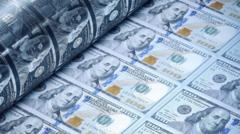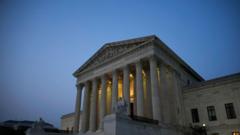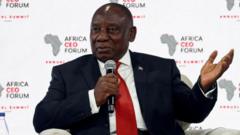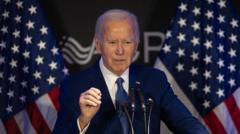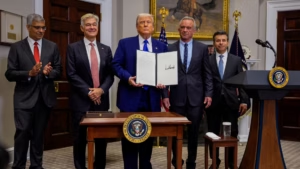Jerome Powell, the Federal Reserve Chairman, declared that he cannot be dismissed by the incoming Trump administration while addressing concerns over the future of U.S. monetary policy. Powell's recent comments came after the Fed announced a cut to borrowing costs, as inflation pressures loom following Trump's proposed economic policies.
Powell Asserts Independence Amid Speculation of Trump Influence on Fed
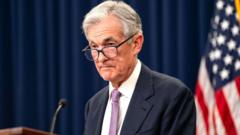
Powell Asserts Independence Amid Speculation of Trump Influence on Fed
Federal Reserve Chairman Jerome Powell reaffirms his position amidst concerns regarding Donald Trump’s potential attempt to influence the central bank.
Jerome Powell, the chairman of the U.S. Federal Reserve, has firmly stated that he cannot be removed from his position by the incoming Trump administration, countering speculation about his tenure as tensions rise over economic policy changes. Speaking at a recent press conference, Powell emphasized that under U.S. law, the White House does not possess the authority to fire him. This assertion was made in the context of the Federal Reserve lowering its key lending rate to a range of 4.5% to 4.75%, marking a significant shift in monetary policy amidst ongoing economic uncertainty.
Concerns about the potential impact of President-elect Trump’s agenda, which includes substantial tax cuts and import tariffs, have prompted economists to speculate on rising inflation and increased government borrowing. Trump’s proposed import duties on goods could lead to higher consumer prices, ultimately complicating the Federal Reserve's forecasts for easing borrowing costs. Powell noted, "It's such an early stage - we don't know what the policies are, we don't know when they will be implemented," stating that the election will not immediately affect the Fed’s policy decisions.
While Trump nominated Powell to lead the Federal Reserve in 2017, the relationship has since become tumultuous, with the former president often criticizing Fed officials and expressing his belief that he could exert control over the central bank. Powell, however, emphasized his commitment to serving his full term, which lasts until 2026, stating clearly, "An attempt to oust me before my term is over is not permitted under the law."
Recent increases in interest rates reflect the broader concerns around rising inflation, which had surged in mid-2022 but showed signs of stabilizing by mid-2023. The central bank’s decision to cut rates twice in succession indicates a careful recalibration towards economic recovery, as officials aim to balance price stability with maintaining a healthy job market amid fluctuating employment figures.
Despite expectations of another rate cut by December, market analysts are cautious about any rapid policy shifts due to uncertainties surrounding fiscal measures and trade policies under Trump's administration. Experts like Whitney Watson from Goldman Sachs suggest that while further rate cuts are anticipated, the central bank might adopt a more conservative approach in the following year, thereby maintaining higher interest rates for an extended period.
In conclusion, as Powell leads the Fed through this transitional phase, he faces the dual challenge of navigating pressures from the new administration while ensuring economic stability in a complex and unpredictable environment.



